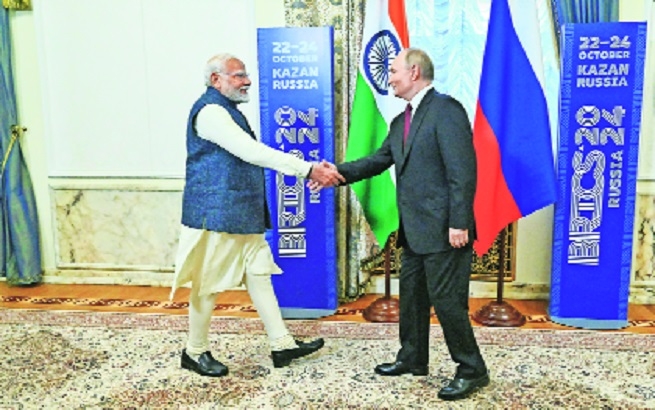India ready to provide all possible cooperation: PM Modi on ending Ukraine conflict
| Date :23-Oct-2024 |

Russian President Vladimir Putin, right, and Indian Prime Minister Narendra Modi shake hands during their meeting on the sidelines of BRICS Summit at Kazan Kremlin in Kazan, Russia, on Tuesday. (AP)
KAZAN :
THE Russia-Ukraine conflict should be resolved in a peaceful manner and India is ready to provide all possible cooperation towards it, Prime Minister Narendra Modi said on Tuesday during his talks with Russian President Vladimir Putin.
Prime Minister Modi held bilateral talks with Putin hours after arriving in this central Russian city to attend the 16th BRICS summit.
In his televised opening remarks, the Prime Minister conveyed to the Russian leader that New Delhi “fully supports” the early return of peace and stability in the region.
Modi also said that his second visit to Russia in the last three months reflected “close” coordination and deep trust between the two countries.
“We are in constant touch on the issue of ongoing conflict between Russia and Ukraine.
As I said earlier, we believe that problems should be resolved in a peaceful manner,” the prime minister said.
“We fully support the early return of peace and stability. All our efforts give priority to humanity. India is ready to provide all possible cooperation in times to come,” he said. “We have the opportunity to discuss all these issues,” he added.
The Prime Minister also referred to his summit talks with Putin in Moscow in July.
Our annual summit resulted in strengthening cooperation in every field, he said.
The Prime Minister congratulated Putin on Russia’s successful presidency of BRICS and said many countries want to join the grouping now.
Putin hosts Global South leaders at BRICS summit intended to counterbalance Western clout: CHINA’S Xi Jinping, India’s Narendra Modi and other global leaders arrived on Tuesday in the Russian city of Kazan for a summit of the BRICS bloc of developing economies that the Kremlin hopes to turn into a rallying point for defying the Western liberal order.
For Russian President Vladimir Putin, the three-day meeting also offers a powerful way to demonstrate the failure of US-led efforts to isolate Russia over its action in Ukraine.
Kremlin foreign affairs adviser Yuri Ushakov touted the summit as “the largest
foreign policy event ever
held” by Russia, with 36 countries attending and more than 20 of them represented by heads of state.
The alliance that initially comprised Brazil, Russia, India, China and South Africa has expanded rapidly to embrance Iran, Egypt, Ethiopia, the United Arab Emirates and Saudi Arabia. Turkey, Azerbaijan and Malaysia have formally applied to become members, and a few others have expressed an interest in joining.
Observers see the BRICS summit as part of the Kremlin’s efforts to showcase support from the Global South amid spiralling tensions with the West and help expand economic and financial ties.
Proposed projects include the creation of a new payment system that would offer an alternative to the global bank messaging network SWIFT and allow Moscow to dodge Western sanctions and trade with partners.
Putin is set to hold about 20 bilateral meetings on the sidelines of the summit, including Tuesday’s encounters with China’s Xi, India’s Modi and South African President Cyril Ramaphosa.
On Thursday, Putin is also set to meet with United Nations Secretary-General Antonio Guterres, who will be making his first visit to Russia in more than two years.
Prime Minister Narendra Modi arrived here on Tuesday. “Landed in Kazan for the BRICS Summit. This is an important Summit, and the discussions here will contribute to a better planet,” Modi posted on X after landing here.
“PM @narendramodi lands in the heritage city of Kazan, Russia. On arrival, PM was warmly received by the Head of the Republic of Tatarstan Rustam Minnikhanov,” Ministry of External Affairs posted on X.
Being hosted by Russia, the summit is being seen as an attempt by non-Western powers to project their clout amid the conflict in Ukraine and the escalating situation in West Asia.
After reaching his hotel, Modi was greeted by the Indian diaspora. Holding the Indian tri-colour, they chanted slogans and sang a cheerful welcome song in Sanskrit.
A team of Russian artists, dressed in traditional Indian attire, presented a Russian dance as Modi watched it with keen interest.
